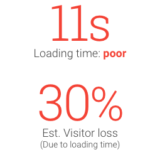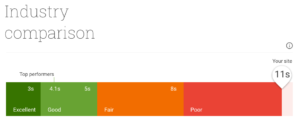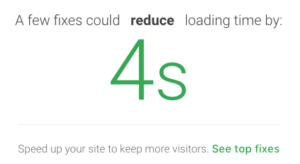How long do you wait for a website to load? 2, 5 or maybe 10 seconds?
Personally, I’m not a very patient person when it’s coming to technology so I usually leave the site within 2-3 seconds if it hasn’t loaded.
According to the latest statistics, half of web users behave similarly. Users demand fast page speeds on websites. They expect a website to load in 2 seconds or less. Another study shows that 75% of users won’t come back to the site if they had trouble with the site loading speed (taking more than 3-4 seconds to load).
Furthermore, users want answers fast, especially if they’re on the go (when we are definitely less patient!). 85% of Internet users expect a mobile site to load as fast or faster than on their desktop.
So if a website takes more than a few seconds to load, users won’t wait, they will abandon the site and click on a different search result. Which will most likely be your competitor.
Why are website loading speeds so important?
Well, we need to consider user experience, search rankings as well as conversions & sales.
User experience
User experience is all about creating an amazing yet simple experience for your visitors. The 2 most important aspects to user experience: give users what they are looking for, and give it fast.
Also, remember that first impressions matter!
If your website loads quickly, your potential customers will be happy as you’ve made a very good first impression. People consider fast websites to be professional and reliable.
On the other hand, a slow website makes people think it’s unsafe, insecure and untrustworthy. And it’s almost impossible to change this first impression later.
So, if you want to improve user experience and make a really good first impression on your potential customers, look closely at your loading speed. Users visiting your site are looking for something, so give it to them as quickly as possible before they go to your competitors.
Conversions & sales
The better the user experience, the more you sell. It’s as simple as that.
If half of your potential customers are leaving your site because of the loading speed, then it’s driving your conversions & sales away.
So if you don’t want to miss revenue opportunities, look at your site’s loading speed.
SEO
In 2010, Google announced that page speed would be one of the ranking factors taken into account when ranking websites. While it’s not the only factor that goes into your search engine rankings, pages that load faster and make use of Google’s recommended best practices tend to do better in search rankings than those that don’t.
In 2017, Google announced that page speed would become an even bigger factor in determining your site’s ranking. Your mobile and desktop sites will now be ranked based on signals Google receives from crawling your site through mobile view. This means that the page speed of your mobile site will determine the rankings of both your mobile and desktop sites in Google.
Google knows that site speed is important for users so, as I’m sure you care about your users, site speed should be important for you as well.
Recently Google updated its site speed tool adding competitor analysis like percentage of visitors lost due to poor loading speed and how your site compares to your industry:



You can have a go here: https://testmysite.withgoogle.com/intl/en-gb
So, how fast is your site? How many potential customers you are loosing because of your site’s loading speed?
What is clear, more now than ever before, is that website speed matters. It affects your user’s experience, your search rankings, your conversions and ultimately, your sales. So, look at your site’s loading speed and improve where needed based on Google’s recommendations.
Agnieszka Szrubkowska









